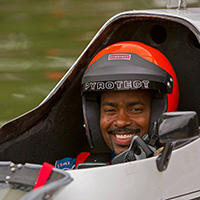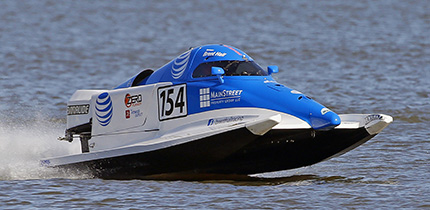
By Chris B. Bennett
The Seattle Medium
Growing up on Mercer Island, Brent Hall, like many other kids who grew up in Seattle, was drawn to hydroplane racing at a young age.
He was so intrigued by hydroplanes that he literally turned almost anything he could into a hydroplane and raced it wherever and whenever he could.
“Everything I saw I wanted to make it a hydroplane,” said Hall in an exclusive interview with The Seattle Medium.
“I built so many different things and turned them into hydroplanes. I even use to take remote control cars and put a hydroplane body on it and we would race those around the parking lot,” he added.
Hall, who is currently ranked #5 in the region and #6 in the nation in the 45SS tunnel hulls division, eventually found his way behind the wheel of a real hydroplane, but his journey to get there was unorthodox and in many ways happened virtually overnight by racing standards.
According to Hall, his mother, Annie Hall loved hydroplanes herself and was very encouraging of his dream of one day racing a boat of his own.
“We use to watch the hydroplanes go off and we’d rush out to the deck [of our house] to watch them run,” says Annie Hall about her son’s introduction to hydroplanes.
“We got him little kits and he could make little hydros that he could run on the water and on the dirt,” she recalled. “He’d make those little kits and he’d run them all around.”
As time went on, Hall’s childhood dream of driving a hydroplane seemed farfetched but that did not stop him from racing boats in the form of remote control racing. Hall built hydroplanes and competed on the RC circuit and got quite good at it. It was exciting at the time, but definitely not the same as driving a big boat.
“I always fell in love with the sport, but never really thought I’d have the opportunity to drive,” said Hall, who manages a call center for AT&T.
As fate would have it, Hall, in his mid-30’s at the time, ran into Skip Young, who was doing PR work for Harold Mills, an African American hydroplane driver from Seattle, and said to Hall, “how would you like to meet the first African American to drive at Seafair?” To which Hall responded, “You don’t have to ask me twice, let’s go.”
The two walked over to Mills, where Hall got to meet the legendary driver for the first time. Hall expressed an interest in working with Mills, and after demonstrating that he was indeed serious about helping out and proving his worth, the ever persistent Hall finally got a call from Mills asking him to be part of his boat crew.
“He said you might be doing anything from washing the boat down to cleaning greasy parts and it’s not glamorous but if you’re up to that and you’re reliable then come on down,” recalled Hall of his conversation with Mills.
That year turned out to be very exciting for Mills as he won his first Seafair trophy.
“It was exciting to watch him,” said Hall. “He didn’t have the best boat but he was an amazing driver. He really took that boat much further than it ever should have gone because he’s an awesome driver.”
While working on the crew for Mills, Hall found his niche in the sport – marketing. The sport was rebounding from some tough times, and Hall’s ability to bring sponsors to the table was invaluable.
Hall kept getting better at the marketing side of the business and was focused on helping Mills get more sponsors and a faster boat. However, the next year, Mills retired and Hall decided to leverage his marketing skills into his own career as a driver.
Hall’s first time driving was for charity as he raised $4,000 for Friends of the Children Seattle. It was both exciting and nerve racking as everything with hydroplane racing, including learning how to drive, is literally learned on the job.
“That’s the thing about hydros,” says Hall. “You can’t just say hey I’m going to go take the hydro for a spin today. The first time I ever got a chance to practice was in a race. There is not warm-up session, there is no open gym, you learn on the course.”
The race was not without problems as Hall’s radio died just as he was leaving the dock. Mills was on the other end of the radio giving Hall instructions, fortunately for Hall his instincts took over as he never heard anything that Mills said while he was on the race course.
“I came back in and [Harold] said ‘hey great job, you did everything I told you to do,’” recalled Hall with a chuckle. “I was like that’s good because I didn’t hear a word you said.”
“So that was a confidence builder,” he continued. “If I can do it by myself the first time then maybe we should continue to grow here.”
According to Hall, from a driving perspective he was at a disadvantage as most of the guys driving hydroplanes today started when they were very young.
“Typically, you’re not a rookie at 36,” says Hall. “A lot of the guys racing today have been racing since they were nine, so I’ve got a steep learning curve when it comes to racing.”
Determined to succeed, Hall bought his own boat and began racing. While he had a lot to learn as a driver, it was his ability to market that provided him with the resources to compete. With support from companies like AT&T, Pignataro VW, Mainstreet Property Group and Boitano Homes, to name a few, Hall has become a good steward for the sport.
“You leverage your strengths,” says Hall. “My strength was marketing. So I knew I could get a following behind me and I understood how to connect with fans using social media, so the marketing side was what really opened the door for me. It definitely wasn’t driving skills because I didn’t have any.”

With the help of Mills and others, Hall was also competitive on the course, as he placed 3rd in the region and 7th in the nation for the 2.5 stock division.
“I knew that boat was a third place boat, it wasn’t super fast but it was very reliable,” says Hall. “I try to drive smart so that I don’t get myself in over my head, but at the same time you’re out there racing and its competitive.”
After getting his feet wet on the “little boats”, Hall got a big break when he leveraged his marketing skills to connect with Jerry Hopp. Hopp, a veteran hydroplane driver whose been driving since 1969, holds 3 out of 5 speed records in the Grand Prix division of the American Power Boat Association (APBA).
According to Hopp, Hall has been instrumental in helping to secure sponsorships and funds to run the boat.
“He approached me and thought that he might have someone who was looking to sponsor a Grand Prix hydroplane,” said Hopp about the beginning of his relationship with Hall.
Hall eventually helped Hopp secure two sponsorships for his boat, and has been working with him ever since. Hall not only helps work on the boat, but he also serves as a back-up driver for Hopps’ Grand Prix boat.
According to Hopp, Hall gets “a chance to learn how to drive the fastest boat on earth for APBA Grand Prix.”
For Hall the ability to learn more about the boats is just as exciting as the opportunity to drive a big boat.
“He (Jerry) and his son have really taught me a lot about fiberglass work and fixing damage on boats,” says Hall. “They even helped me paint my little boat.”
With limited opportunities in the sport, Hall is quick to point out that he has been very fortunate to have the support of so many good people.
“I’ve always been a believer that if you give, it’s just amazing how things come your way,” says Hall.
“You really can’t do it without others,” he continued. “You can’t do it without helping others, and you can’t do it without other people helping you.”
In Hall, Hopp sees a hard worker who really wants to learn as much as he can.
“It’s his interest in learning the correct way to do everything,” says Hopp about what makes Hall special. “He asks questions and watches and listens. He gets in there and sands, turns wrenches, and does all that stuff as well as driving a boat.”
While marketing has opened the doors for Hall, it also is a source of motivation.
“I’ve been there already [driving a hydroplane], but I’ve done it way before others because of the marketing and there’s always that cloud over me that [says] well he’s just a marketing guy, or he’s not really a racer,” continued Hall. “That’s something that I have to chase day in and day out is continuing to prove myself.”
While it might be easy for Hall to let success go to his head, he is grounded enough to know that he could not have made it this far without the unwavering support of others.
“I know there is no way I would have come as far as I have without a mentor in Harold, without family that believes in me, without a wife that says hey if that’s your dream go follow it,” said Hall. “If I didn’t have that there’s no way I could get this done.”
Hall has a new boat this year and will compete in four “little boat” races. He will also share time on the “big boat” circuit with Jerry Hopp, and hopes, more than anything else that he can create the same type of excitement for hydroplane racing today as there was when he was a young kid watching the races from the deck of his parent’s house.
“I want to put hydroplane racing back on the map again,” says Hall. “I definitely understand the marketing and how important it is to engage your fans and the public. Until they fall in love with the drivers, they wont fall in love with the sport.”
Despite his busy schedule, Hall still finds time for charitable work and you can always find him visiting with kids and talking to them about hydroplane racing throughout the year.



